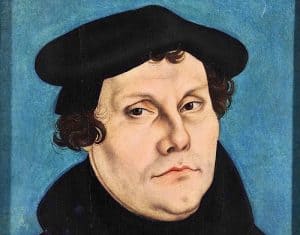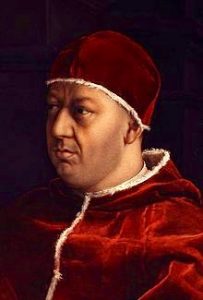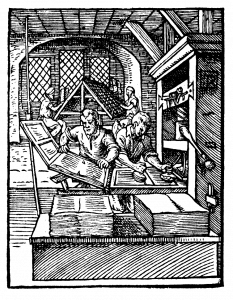Tormented by the fear that he never would be able to please God and be admitted into heaven, Augustinian monk Martin Luther immersed himself in a host of spiritual disciplines, including prayer, fasting, and the ascetic practices of flogging himself, denying himself sleep, and staying out in frigid temperatures without a blanket or other adequate cover. Luther said, “If anyone could have earned heaven by the life of a monk, it was I.”

Initially, Luther’s study of Scripture only reinforced the terror he felt at the thought of standing before a holy God. Romans 1:17 later would bring him relief, assurance, and hope. The passage declares, “For in the gospel the righteousness of God is revealed—a righteousness that is by faith from first to last, just as it is written: ‘The righteous will live by faith.’” Martin didn’t yet see that faith comes before righteousness. Focusing on the last portion of the verse — “the righteous will live by faith,” — Luther felt condemned. He knew he wasn’t righteous. How, then, could he live by faith?
For in the gospel the righteousness of God is revealed—a righteousness that is by faith from first to last, just as it is written: “The righteous will live by faith.”
—The apostle Paul in his letter to the Roman Christians, in what we now know as Romans 1:17—
Luther became a professor at the University of Wittenberg. In 1513 and 1514 he presented lectures on the Book of Psalms. He also continued studying Paul’s letter to the Romans—and then the truth of Paul’s words dawned on him. Luther later would testify,
Day and night I was pondering this question: What about this gift of righteousness given in response to faith? When I began to see that there is a righteousness you receive by sheer faith, and I receive that righteousness, it was as if I walked through the gates of Paradise.
When I began to see that there is a righteousness you receive by sheer faith, and I receive that righteousness, it was as if I walked through the gates of Paradise.
—Martin Luther—
Faith in Christ, Luther learned, comes first, and then righteousness—a righteousness from God appropriated by faith—follows. It was a liberating insight, the first of many. Martin Luther would share his insights in his role of priest for Wittenberg’s Castle Church, which he assumed in 1514. People flocked to hear him.

We should remember that at that time there was only one Church—the Catholic Church headquartered in Rome. Leo X was the Pope. Martin Luther began to see clearly a host of ways the Church had been abusing its power and authority. He came to understand that God, not the Church, had the authority to dispense salvation and forgiveness. Yet through the sale of “indulgences” the Church was raising money for various building projects. Buy an indulgence for yourself or a loved one, the Church claimed throughout its spokesman-salesman Johann Tetzel, and you will have brought forgiveness to yourself or to another. The purchase of an indulgence, Tetzel declared, even could free a departed loved one from purgatory!
Luther could not reconcile these teachings with Scripture, and he drew up a list of 95 statements that refuted the Church’s teachings and practices and presented the biblical doctrine of salvation by grace alone through faith alone. Three other doctrines that would arise from the Reformation are Scripture alone, Christ alone, and to the glory of God alone. These are called the “five solas,” since sola in Latin means “alone.”
On October 31, 1517, Martin Luther nailed his 95 Theses on what essentially was the University’s bulletin board—the door of the Wittenberg Church.

The printing press, which had been invented during the previous century, made it possible for news to spread quickly and reliably—and Luther’s 95 Theses went viral. It was the spark that ignited the Protestant Reformation, a movement of which you and I are direct beneficiaries even today, 500 years later (also go here).
This coming Tuesday, October 31, 2017, is indeed the 500th anniversary of Luther’s act of posting his 95 statements challenging the Church with regard to its abuses and its departures from Scriptural truth and practice.
I encourage you to learn more about Martin Luther, other Reformers, and the Protestant Reformation as a whole. Here are a few resources you might find helpful.
Now, fast forward 500 years. Yes, we still are benefiting from the Protestant Reformation, but it is becoming increasingly evident that the evangelical church in the 21st century needs a reformation of its own. The abuses and problems aren’t the same as those Martin Luther challenged 500 years ago, but problems are present that must be addressed.
The evangelical church in the 21st century needs a reformation of its own.
I do not pretend to be a second Martin Luther, but a variety of beliefs and practices within evangelicalism need to be challenged. The 500th anniversary of Luther’s action is a fitting occasion for me to express my concerns.
Therefore, on Tuesday, October 31, I will post my own 95 Theses for the Protestant Evangelical Church in the 21st Century.
Look for it here, at www.wordfoundations.com.
Copyright © 2017 by B. Nathaniel Sullivan. All rights reserved.
95 Theses for the Protestant Evangelical Church in the 21st Century
Unless otherwise indicated, Scripture passages are taken from The Holy Bible, New International Version®, NIV® Copyright © 1973, 1978, 1984, 2011 by Biblica, Inc.® Used by permission. All rights reserved worldwide.
top image: Hot off the press! The first two pages of Luther’s 95 Theses as a pamphlet

Be First to Comment